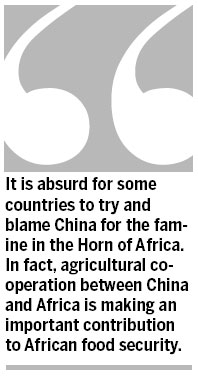
Emergency aid and agricultural support from China have made an important contribution to food security in Africa
The Chinese government is deeply concerned about the serious drought and famine in the Horn of Africa.
Premier Wen Jiabao declared on Monday, in his meeting with Prime Minister of Ethiopia Meles Zenawi, that the Chinese government will provide an additional 353.2 million yuan ($55.28 million) in emergency food aid to help Ethiopia and other drought-hit African countries cope with the current famine. China had already announced 90 million yuan in food aid earlier this month.
The aid from the Chinese government, in the form of both cash and food, will be distributed to victims of the famine through bilateral channels as well as multilateral channels such as UN agencies.
It is absurd for some countries to try and blame China for the famine in the Horn of Africa. In fact, agricultural cooperation between China and Africa is making an important contribution to African food security.
China has built more than 40 agricultural cooperative projects in more than 30 African countries since the 1960s, helping African countries develop their production of rice, corn, vegetables, tea and sugar cane. In recent years, the Chinese government has attached even more significance to the food security issue of Africa and increased its input into African agriculture.
At the Beijing Summit of the Forum on China-Africa Cooperation in 2006, the Chinese government declared it would dispatch 100 top agricultural specialists to Africa and build 10 centers to introduce agricultural technologies within three years. At the 4th Ministerial Conference of Forum on China-Africa Cooperation in 2009, the Chinese government declared that the number of agricultural technology centers would be increased to 20, and 50 agricultural technology teams would be sent to Africa to train 2,000 local specialists in three years.
From 2007 to 2009, China sent 104 senior agricultural technology specialists to 33 African countries to help them draft agricultural development plans and provide consulting services and professional training to local technicians. China has now built agricultural technology centers in 14 African countries including Ethiopia, Mozambique and Zambia and is building 10 more in Angola, the Democratic Republic of Congo, South Sudan and other countries. The Chinese government has sent 16 teams of agricultural specialists to 13 African countries that have trained 874 local agricultural technicians since 2009.
Through multilateral channels, China has sent more than 700 agricultural experts to eight African countries under the framework of the "Special Programme for Food Security" (SPFS) of the United Nation's Food and Agriculture Organization (FAO). More than 80 Chinese experts are now working in African countries. In 2009, the Chinese government decided to contribute $30 million to the FAO building a trust fund to promote South-South Cooperation between China and African under the SPFS.
The Chinese government also encourages Chinese enterprises to invest in agriculture in Africa, by building agricultural infrastructure and transfering agricultural technologies. Chinese companies invested about $30 million in African agriculture in 2009. In Malawi, a joint venture funded by Chinese enterprises and the China-Africa Development Fund is increasing the incomes of local planters by a large margin by greatly improving their cotton production capacity.
In Democratic Republic of Congo, Chinese enterprises have funded corn seed selection and helped local corn producers qualify as suppliers to the World Food Program. They have also trained local staff for independent agricultural production.
Agriculture is a strategic industry for national security and stability. As a developing country, China fully understands African countries' concerns about food security. The Chinese government has repeatedly demonstrated its understanding of the difficulties and challenges confronting the food security of African countries and will continue to help African countries improve their food security conditions.
China focuses on improving African countries' food production capacity in its cooperation with Africa. China has not taken one single grain from Africa. In the future, the Chinese government will continue to introduce more agricultural technologies, train local specialists, build agricultural infrastructure, promote agricultural production and trade and provide necessary food aid.
The author is director-general of the Department of African Affairs, Foreign Ministry of China.
(China Daily 08/19/2011 page8)